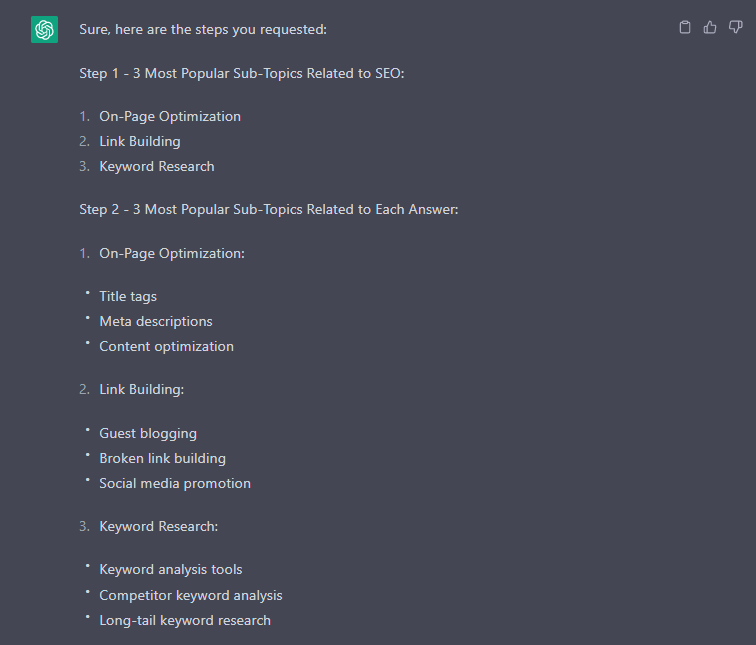Celebrate the Holidays with some of SEJ’s best articles of 2023.
Our Festive Flashback series runs from December 21 – January 5, featuring daily reads on significant events, fundamentals, actionable strategies, and thought leader opinions.
2023 has been quite eventful in the SEO industry, and our contributors produced some outstanding articles to keep pace and reflect these changes.
Catch up on the best reads of 2023 to give you plenty to reflect on as you move into 2024.
ChatGPT for keyword research does not replace traditional keyword research tools.
And just like keyword research tools, you shouldn’t unthinkingly rely on them alone to do your keyword research.
Instead, I will show you in this post how ChatGPT can be one of the best free keyword research tools you should add to your SEO toolbox.
Save countless hours going down competitor websites, keyword rabbit holes, and topic analysis.
Steal my most effective prompts for conducting keyword research – and if you can hold off on trying them out and get to the end of the article, I will provide you with some additional advanced use cases for ChatGPT and keyword research.
Let’s jump straight into what you care about the most: the prompts.
Best ChatGPT Keyword Research Prompts
The beauty of the following ChatGPT keyword research prompts is that they can be used on any niche, even a topic to which you are brand new.
However, for this demonstration, let’s use the topic of “SEO” to demonstrate these prompts.
Generating Keyword Ideas Based On A Topic
What Are The {X} Most Popular Sub-topics Related To {Topic}?
-
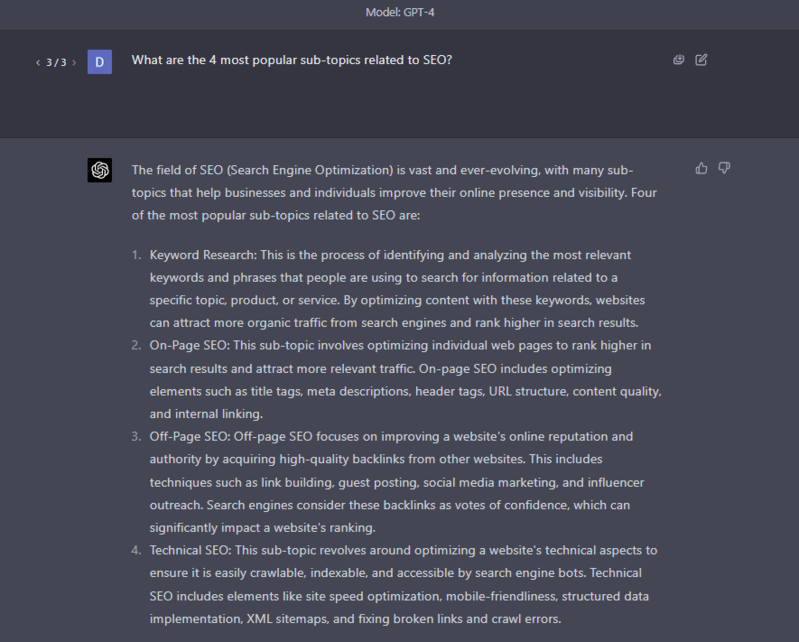 Screenshot from ChatGPT, March 2023
Screenshot from ChatGPT, March 2023
The first prompt is to give you an idea of the niche.
As shown above, ChatGPT did a great job understanding and breaking down SEO into three pillars: on-page, off-page & technical.
The key to the following prompt is to take one of the topics ChatGPT has given and query the sub-topics.
What Are The {X} Most Popular Sub-topics Related To {Sub-topic}?
For this example, let’s query, “what are the most popular sub-topics related to keyword research”.
Having done keyword research for over 10 years, I would expect it to output information related to keyword research metrics, the types of keywords, and intent.
Let’s see.
-
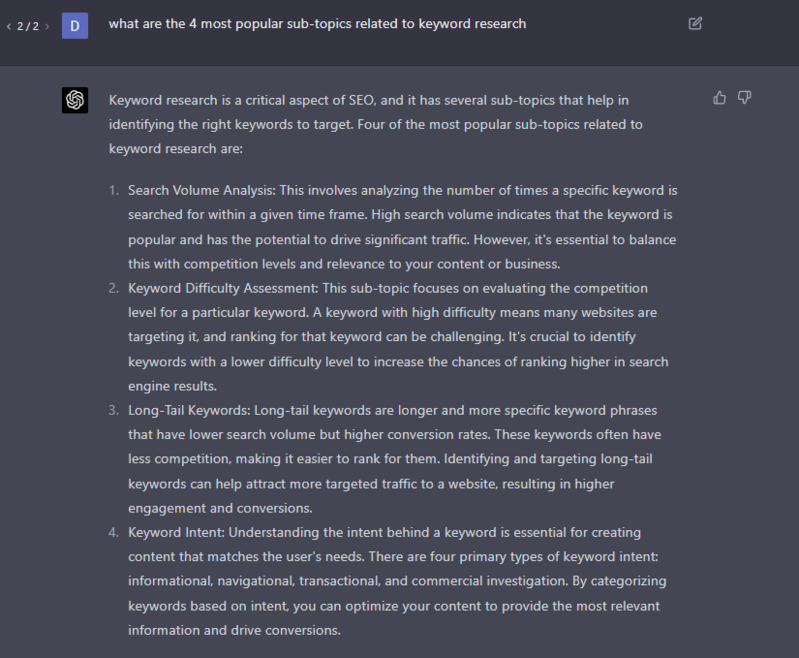 Screenshot from ChatGPT, March 2023
Screenshot from ChatGPT, March 2023
Again, right on the money.
Now, to get the keywords.
But to reiterate, this guide on ChatGPT keyword research is not to get you to replace traditional tools; it is to show how you can leverage ChatGPT to give you ideas to plug into those tools to verify.
To get the keywords you want without having ChatGPT describe each answer, use the prompt “list without description.”
Here is an example of that.
List Without Description The Top {X} Most Popular Keywords For The Topic Of {X}
-
 Screenshot from ChatGPT, March 2023
Screenshot from ChatGPT, March 2023
You can even branch these keywords out further into their long-tail.
Example prompt:
List Without Description The Top {X} Most Popular Long-tail Keywords For The Topic “{X}”
-
 Screenshot from ChatGPT, March 2023
Screenshot from ChatGPT, March 2023
List Without Description The Top Semantically Related Keywords And Entities For The Topic {X}
Who needs those expensive content optimization tools? You can even ask ChatGPT what any topic’s semantically related keywords and entities are!
-
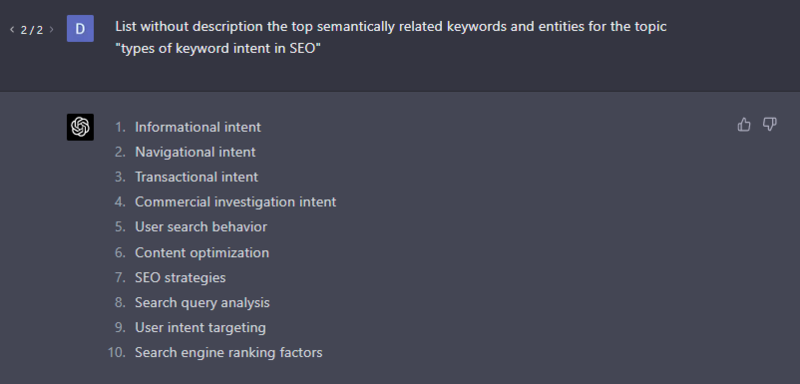 Screenshot from ChatGPT, March 2023
Screenshot from ChatGPT, March 2023
Tip: The Onion Method Of Prompting ChatGPT
When you are happy with a series of prompts, add them all to one prompt. For example, so far in this article, we have asked ChatGPT the following:
- What are the four most popular sub-topics related to SEO?
- What are the four most popular sub-topics related to keyword research
- List without description the top five most popular keywords for “keyword intent”?
- List without description the top five most popular long-tail keywords for the topic “keyword intent types”?
- List without description the top semantically related keywords and entities for the topic “types of keyword intent in SEO.”
Take all five, and combine them into one prompt by telling ChatGPT to perform a series of steps. Example;
“Perform the following steps in a consecutive order Step 1, Step 2, Step 3, Step 4, and Step 5”
Example:
“Perform the following steps in a consecutive order Step 1, Step 2, Step 3, Step 4 and Step 5. Step 1 – Generate an answer for the 3 most popular sub-topics related to {Topic}?. Step 2 – Generate 3 of the most popular sub-topics related to each answer. Step 3 – Take those answers and list without description their top 3 most popular keywords. Step 4 – For the answers given of their most popular keywords, provide 3 long-tail keywords. Step 5 – for each long-tail keyword offered in the response, a list without descriptions 3 of their top semantically related keywords and entities.”
Generating Keyword Ideas Based On A Question
Taking the steps approach from above, we can get ChatGPT to help streamline getting keyword ideas based on a question. For example, let’s ask, “What is SEO?”
“Perform the following steps in a consecutive order Step 1, Step 2, Step 3, and Step 4. Step 1 Generate 10 questions about “{Question}”?. Step 2 – Generate 5 more questions about “{Question}” that do not repeat the above. Step 3 – Generate 5 more questions about “{Question}” that do not repeat the above. Step 4 – Based on the above Steps 1,2,3 suggest a final list of questions avoiding duplicates or semantically similar questions.”
-
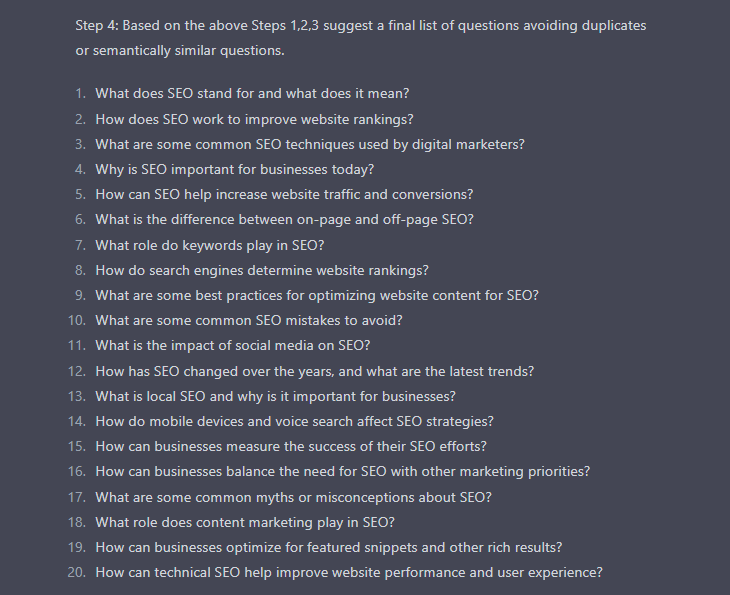 Screenshot from ChatGPT, March 2023
Screenshot from ChatGPT, March 2023
Generating Keyword Ideas Using ChatGPT Based On The Alphabet Soup Method
One of my favorite methods, manually, without even using a keyword research tool, is to generate keyword research ideas from Google autocomplete, going from a to z.
-
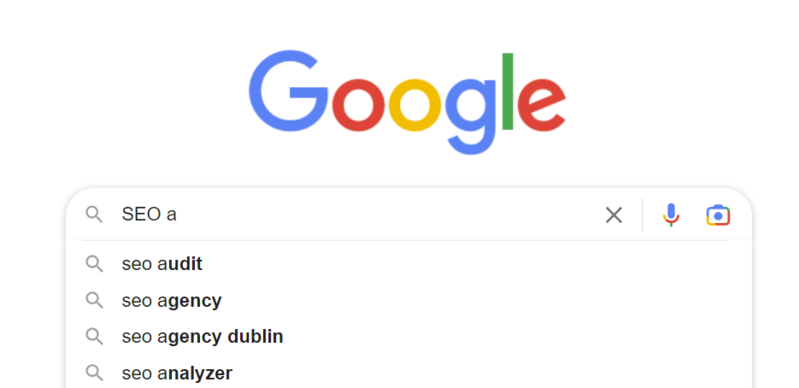 Screenshot from Google.com Autocomplete, March 2023
Screenshot from Google.com Autocomplete, March 2023
You can also do this using ChatGPT.
Example prompt:
“give me popular keywords that includes the keyword ‘SEO,’ and the next letter of the word starts with a”
-
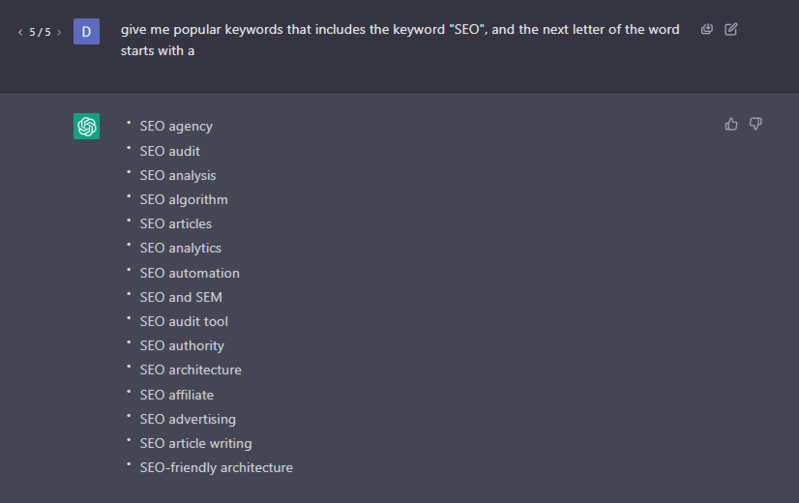 Screenshot from ChatGPT, March 2023
Screenshot from ChatGPT, March 2023
Tip: Using the onion prompting method above, we can combine all this in one prompt.
“Give me five popular keywords that include ‘SEO’ in the word, and the following letter starts with a. Once the answer has been done, move on to giving five more popular keywords that include ‘SEO’ for each letter of the alphabet b to z.”
-
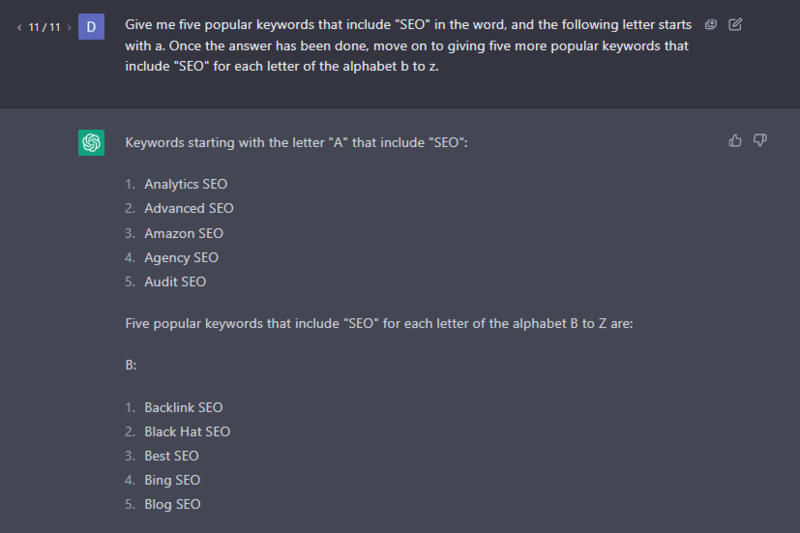 Screenshot from ChatGPT, March 2023
Screenshot from ChatGPT, March 2023
Generating Keyword Ideas Based On User Personas
When it comes to keyword research, understanding user personas is essential for understanding your target audience and keeping your keyword research focused and targeted. ChatGPT may help you get an initial understanding of customer personas.
Example prompt:
“For the topic of “{Topic}” list 10 keywords each for the different types of user personas”
-
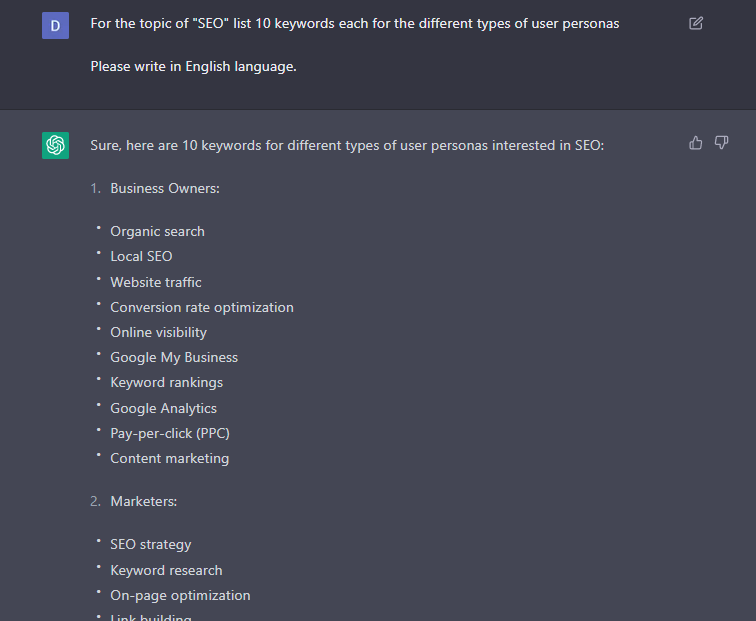 Screenshot from ChatGPT, March 2023
Screenshot from ChatGPT, March 2023
You could even go a step further and ask for questions based on those topics that those specific user personas may be searching for:
-
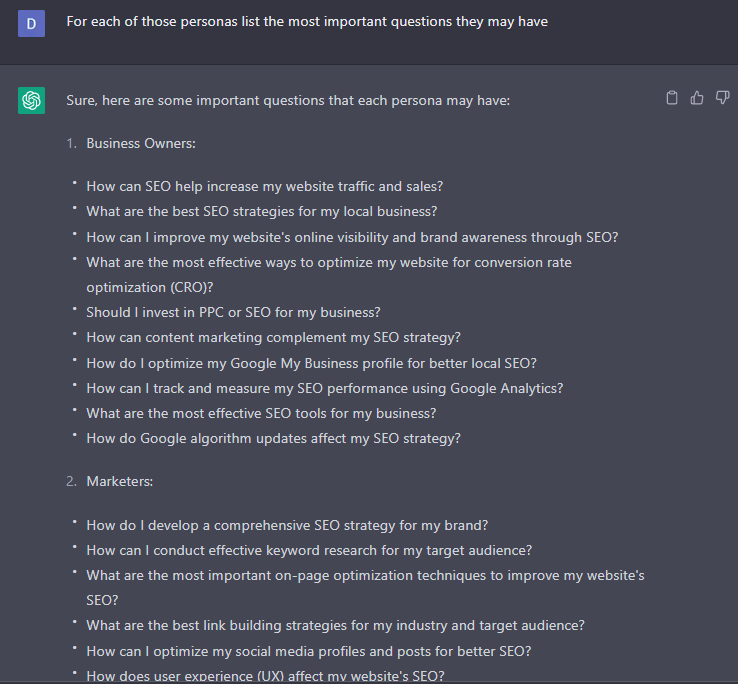 Screenshot from ChatGPT, March 2023
Screenshot from ChatGPT, March 2023
As well as get the keywords to target based on those questions:
“For each question listed above for each persona, list the keywords, as well as the long-tail keywords to target, and put them in a table”
-
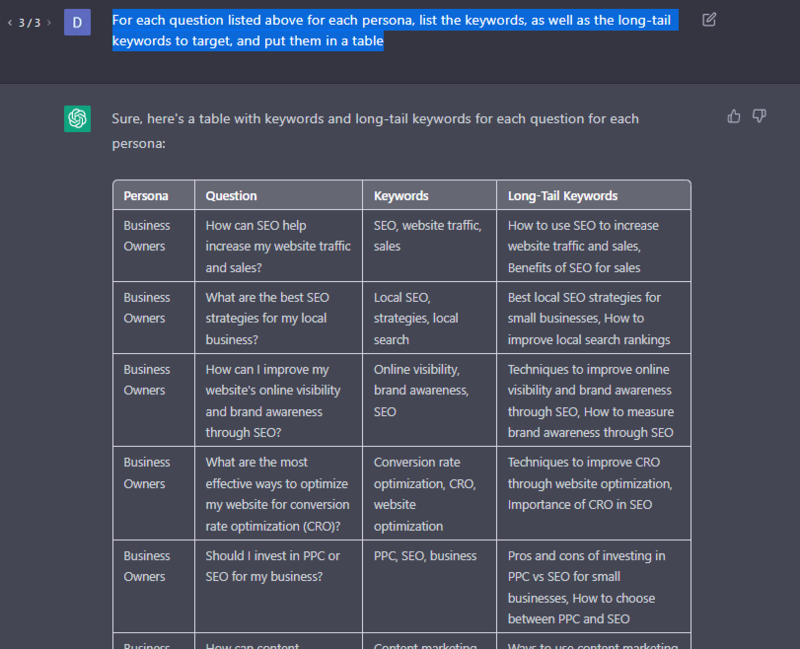 Screenshot from ChatGPT, March 2023
Screenshot from ChatGPT, March 2023
Generating Keyword Ideas Using ChatGPT Based On Searcher Intent And User Personas
Understanding the keywords your target persona may be searching is the first step to effective keyword research. The next step is to understand the search intent behind those keywords and which content format may work best.
For example, a business owner who is new to SEO or has just heard about it may be searching for “what is SEO.”
However, if they are further down the funnel and in the navigational stage, they may search for “top SEO firms.”
You can query ChatGPT to inspire you here based on any topic and your target user persona.
SEO Example:
“For the topic of “{Topic}” list 10 keywords each for the different types of searcher intent that a {Target Persona} would be searching for”
-
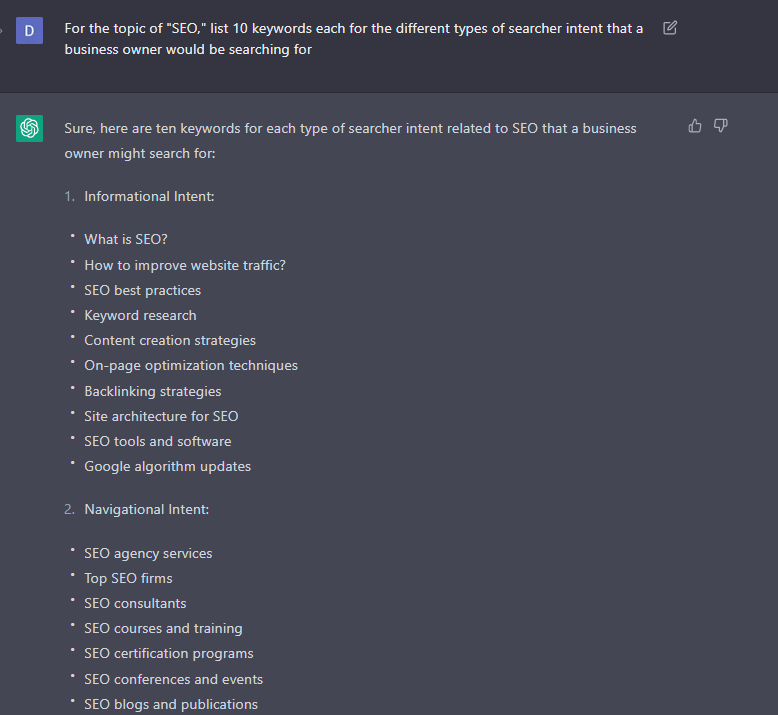 Screenshot from ChatGPT, March 2023
Screenshot from ChatGPT, March 2023
ChatGPT As Your Keyword Research Assistant
Some of you may still be on the fence about using ChatGPT in your daily SEO workflows. However, I can honestly tell you that one of the three windows I have open daily doing SEO work is ChatGPT.
In particular for idea generation – as shown above – but also for time-consuming spreadsheet tasks.
Using ChatGPT As A Keyword Categorization Tool
One of these use cases is for keyword categorization.
In the past, I would have had to devise spreadsheet formulas to categorize keywords or even spend hours filtering and manually categorizing keywords.
ChatGPT can be a great companion to run a short version of this for you.
Let’s say you have done keyword research in a keyword research tool, have a list of keywords, and want to categorize them.
You could use the following prompt:
“Filter the below list of keywords into categories, target persona, searcher intent, search volume and add information to a six-column table: List of keywords – [LIST OF KEYWORDS], Keyword Search Volume [SEARCH VOLUMES] and Keyword Difficulties [KEYWORD DIFFICUTIES].”
-
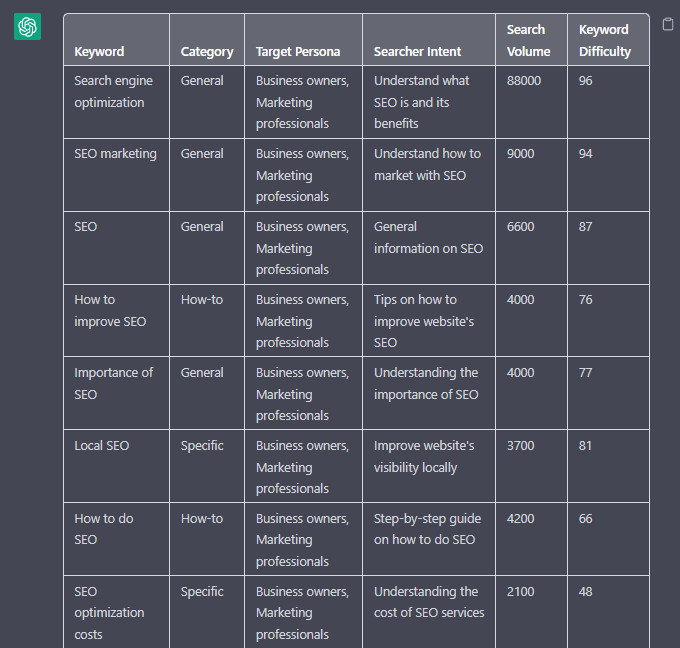 Screenshot from ChatGPT, March 2023
Screenshot from ChatGPT, March 2023
Tip: Add keyword metrics from the keyword research tools, as using the search volumes that a ChatGPT prompt may give you will be wildly inaccurate at best.
Using Chat GPT For Keyword Clustering
Another of ChatGPT’s use cases for keyword research is to help you cluster. Many keywords have the same intent, and by grouping related keywords, you may find more often than not that one piece of content can target multiple keywords at once.
A great use case for this is for clustering People Also Ask (PAA) questions.
Let’s use the free SEO Minion plugin to extract all PAAs for the question, “What is SEO?”
-
 Screenshot from SEOMinion, March 2023
Screenshot from SEOMinion, March 2023
Note: Although my favorite way of doing this is using SEO Minion, here’s a list of free tools to help you find the questions people search for.
Then, using the following prompt, we can group keywords based on their semantic relationships. For example:
“Organize the following keywords into groups based on their semantic relationships, and give a short name to each group: [LIST OF PAA], create a two-column table where each keyword sits on its own row.
-
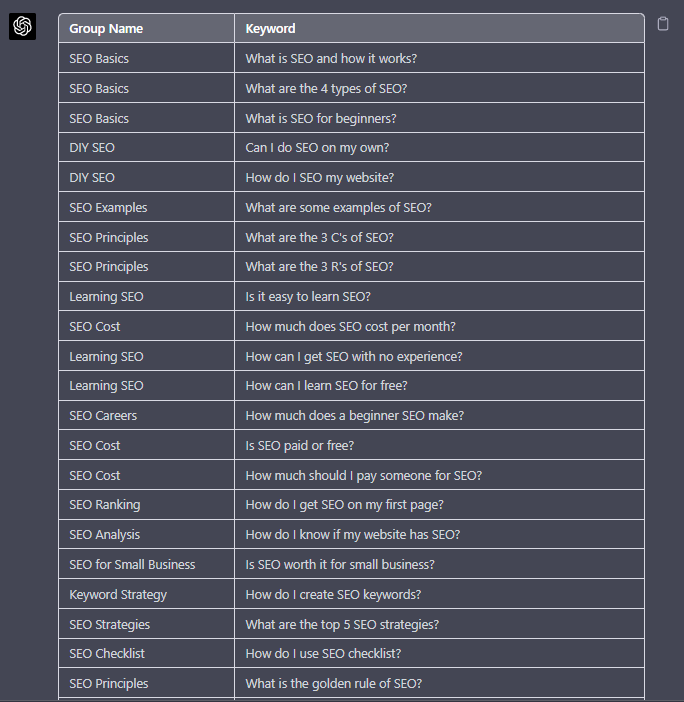 Screenshot from ChatGPT, March 2023
Screenshot from ChatGPT, March 2023
Using Chat GPT For Keyword Expansion By Patterns
One of my favorite methods of doing keyword research is pattern spotting.
Most seed keywords have a variable that can expand your target keywords.
Here are a few examples of patterns:
1. Question Patterns
(who, what, where, why, how, are, can, do, does, will)
“Generate [X] keywords for the topic “[Topic]” that contain any or all of the following “who, what, where, why, how, are, can, do, does, will”
-
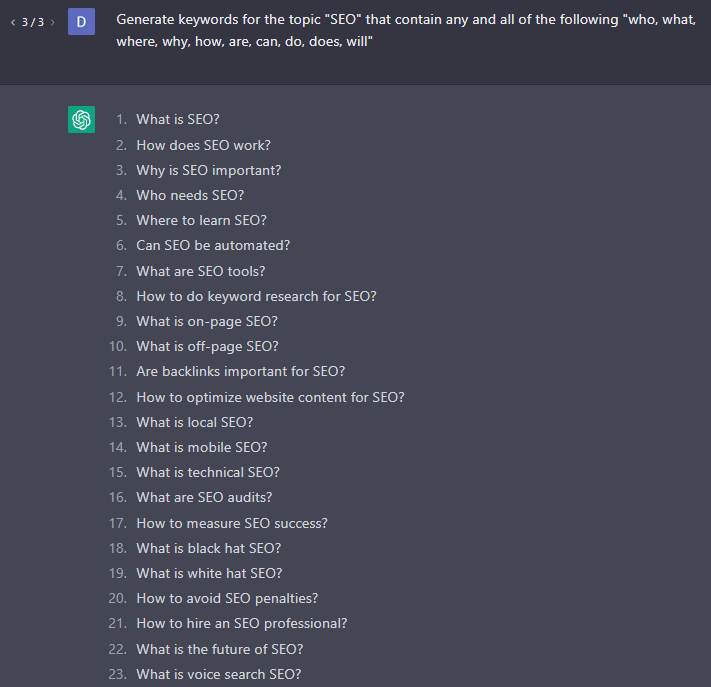 Screenshot from ChatGPT, March 2023
Screenshot from ChatGPT, March 2023
2. Comparison Patterns
Example:
“Generate 50 keywords for the topic “SEO” that contain any or all of the following “for, vs, alternative, best, top, review”
-
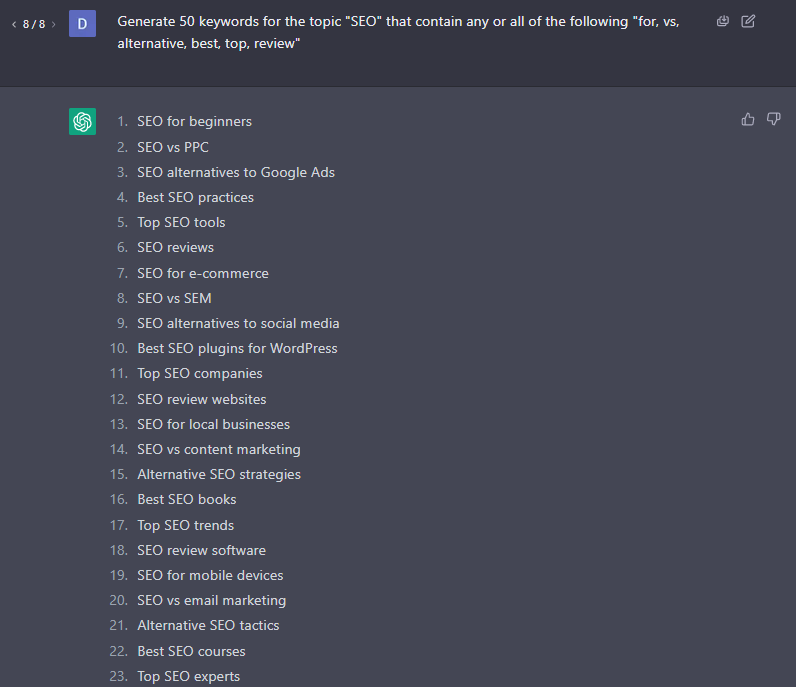 Screenshot from ChatGPT, March 2023
Screenshot from ChatGPT, March 2023
Or let’s say you were striving for “topical authority“; you could take one of those modifiers and get a full list of comparison queries for one variable.
Example:
“Generate 50 keywords for the topic “[Topic]” that contain “vs”
-
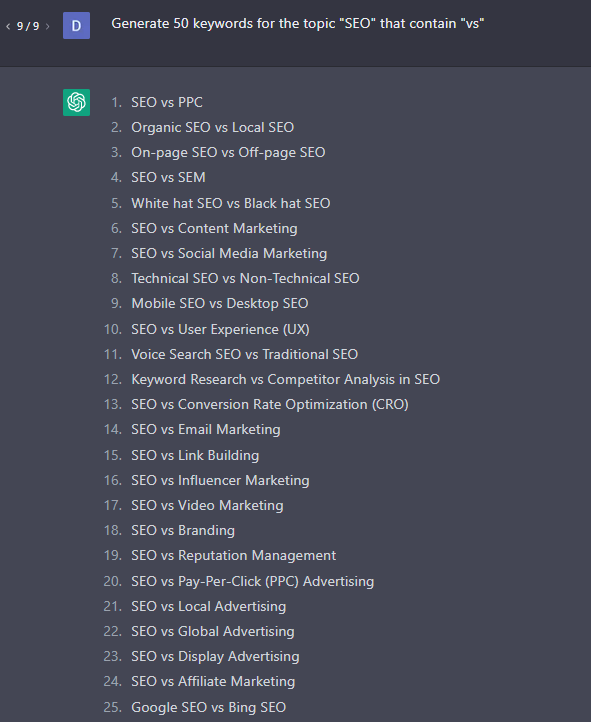 Screenshot from ChatGPT, March 2023
Screenshot from ChatGPT, March 2023
3. Brand Patterns
Another one of my favorite modifiers is a keyword by brand.
We are probably all familiar with the most popular SEO brands; however, if you weren’t, you could lean on your AI friend to do the heavy lifting.
Example prompt:
“For the top {Topic} brands what are the top “vs” keywords”
-
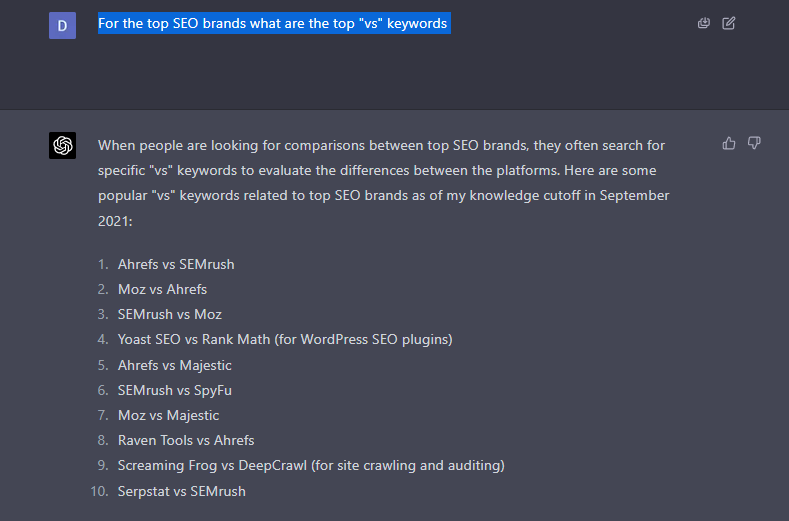 Screenshot from ChatGPT, March 2023
Screenshot from ChatGPT, March 2023
4. Search Intent Patterns
One of the most common search intent patterns is “best.” When someone is searching for a “best {topic}” keyword, they are generally searching for a comprehensive list or guide that highlights the top options, products, or services within that specific topic, along with their features, benefits, and potential drawbacks, to make an informed decision.
Example:
“For the topic of “[Topic]” what are the 20 top keywords that include “best”
-
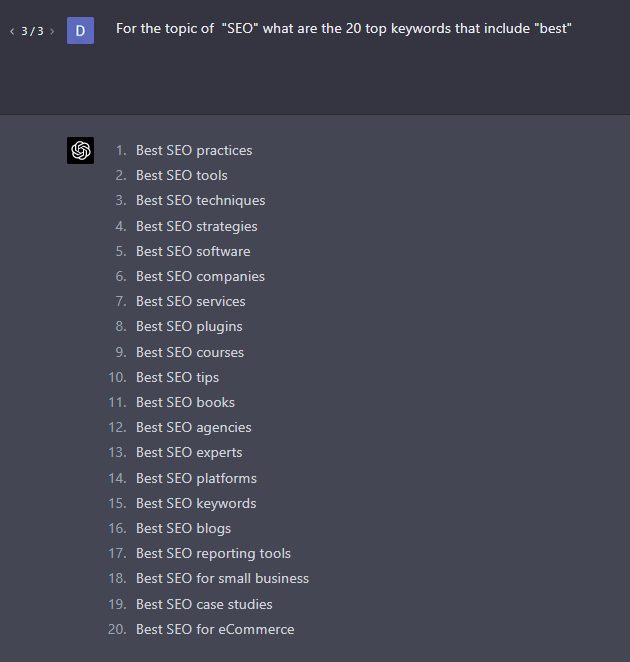 Screenshot from ChatGPT, March 2023
Screenshot from ChatGPT, March 2023
Again, this guide to keyword research using ChatGPT has emphasized the ease of generating keyword research ideas by utilizing ChatGPT throughout the process.
Keyword Research Using ChatGPT Vs. Keyword Research Tools
Free Vs. Paid Keyword Research Tools
Just like keyword research tools, there are free and paid options for ChatGPT.
But one of the most significant drawbacks of using ChatGPT for keyword research alone is the absence of SEO metrics to help you make smarter decisions.
The other downside of ChatGPT is that it is only in its infancy, and the keywords it suggests may be inaccurate.
To improve accuracy, you could take the results it gives you and verify them with your classic keyword research tool – or vice versa, as shown above, uploading accurate data into the tool and then prompting.
However, you must consider how long it takes to type and fine-tune your prompt to get your desired data versus using the filters within popular keyword research tools.
For example, if we use a popular keyword research tool using filters, you could have all of the “best” queries with all of their SEO metrics:
-
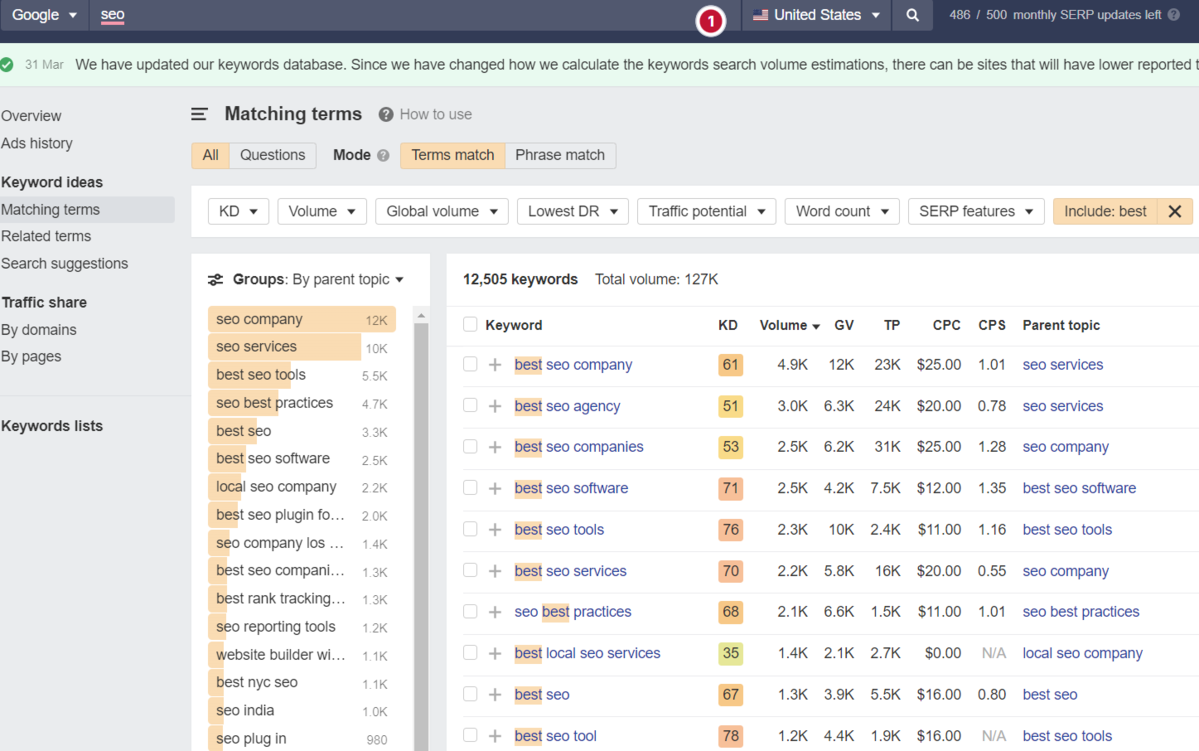 Screenshot from Ahrefs Keyword Explorer, March 2023
Screenshot from Ahrefs Keyword Explorer, March 2023
And unlike ChatGPT, generally, there is no token limit; you can extract several hundred, if not thousands, of keywords at a time.
That is not to say that ChatGPT does not have its place in keyword research; quite the contrary. It can be your new super-intelligent SEO assistant, giving you endless ideas.
The key is how you prompt. And, hopefully, the prompts I have shared with you will give you a glimpse into how ChatGPT can help with keyword research.
Bonus: Enhancing Keyword Research Using The Chat GPT API (Open AI API)
As promised at the start, if you made it to the end of this article, I would share an advanced use case for ChatGPT and keyword research.
And if you have read my previous guide, you will know that doing keyword research for news websites is different. It is all about trending keywords – and sometimes, keywords that have never been searched.
Sometimes, people can be prompted to search based on seeing something on social. This is why social media listening tools can be a great way to get insights into trends and what people may be searching for.
Well, what if you could automate some of that process?
Thanks to Kristin Tynski from Fractl, you can.
Kristin has kindly permitted me to share her Python script with you to try.
Her script automatically scrapes Reddit for top posts on any topic (1 day, 1 week, 1 month, 6 months, 1 year, all time).
It uses the power of the Open AI API and its natural language processing power to perform trend analysis on the data.
You can read a full explanation of her script in her LinkedIn post.
But let’s go ahead and demo her script to find the latest trending SEO topics on Reddit within the past week, as an example.
-
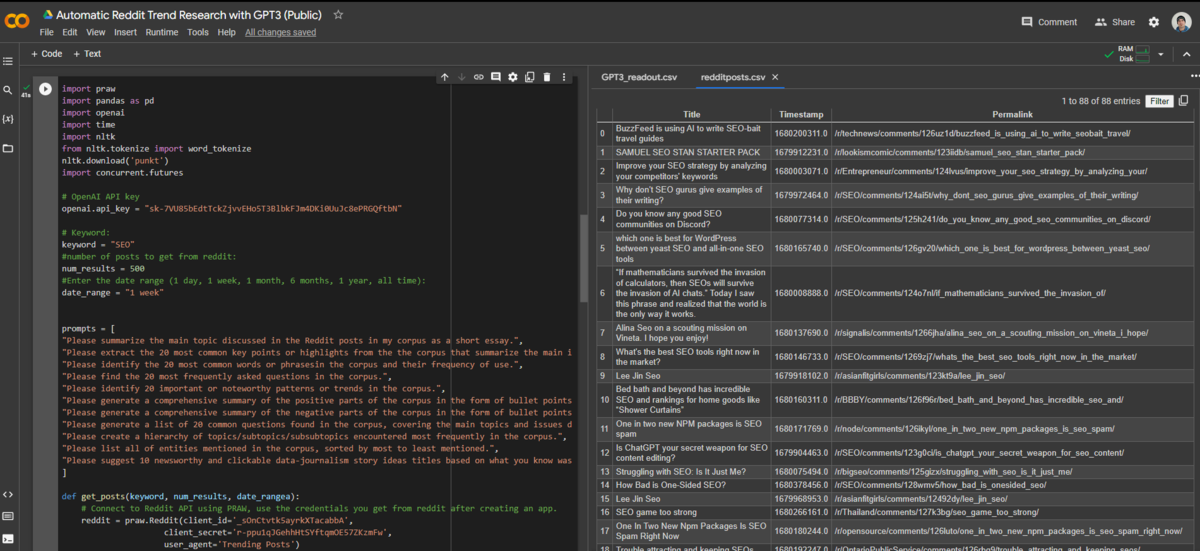 Screenshot from Google Collab, March 2023
Screenshot from Google Collab, March 2023
You could take those titles and prompt;
“Extract the primary keyword from these titles [Titles], then add the keywords and corresponding titles in a table.”
-
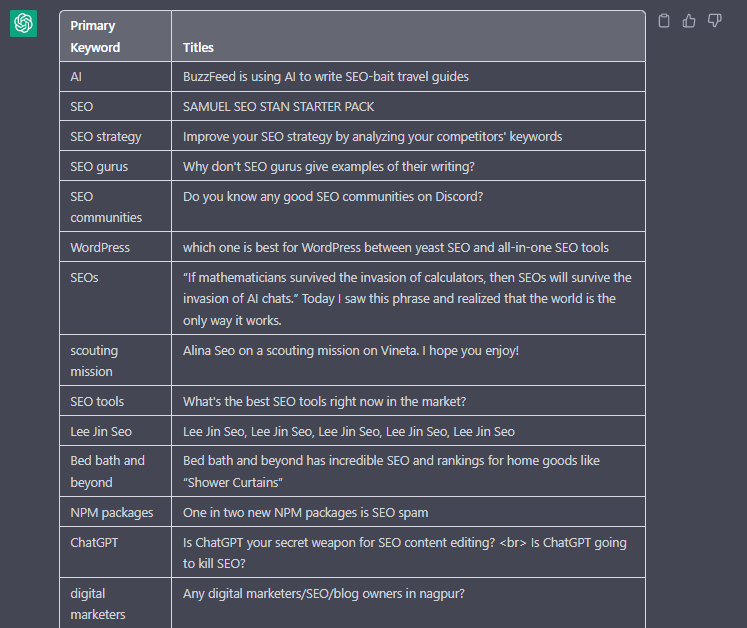 Screenshot from ChatGPT, March 2023
Screenshot from ChatGPT, March 2023
And if we look at Google Trends for the search term “AI SEO,” we can verify that this is a trending keyword:
-
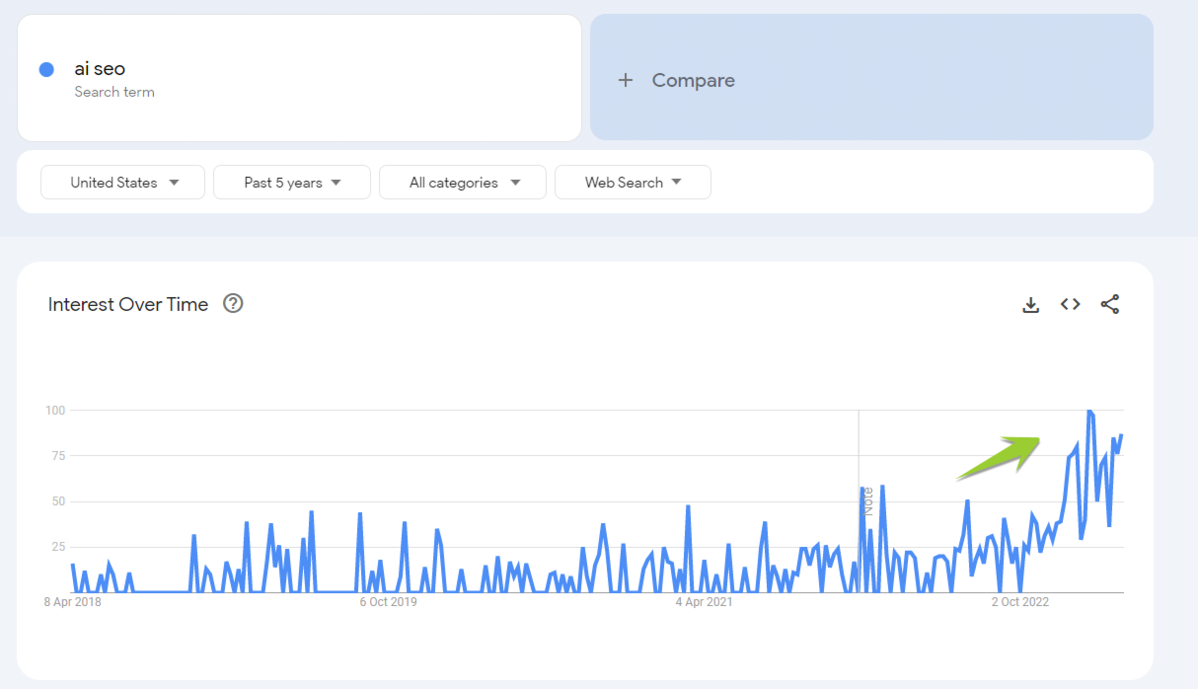 Screenshot from Google Trends, March 2023
Screenshot from Google Trends, March 2023
-
Key Takeaway
ChatGPT can be a valuable resource for keyword research.
An endless bank of keyword research ideas.
A powerful assistant to help you speed up your keyword research processes.
However, you cannot unquestioningly trust the data or SEO metrics it may attempt to provide you with.
That is why, paired with traditional keyword research tools, leveraging ChatGPT for keyword research can be a powerful tool in your arsenal.
More resources:
Featured Image: Tatiana Shepeleva/Shutterstock


